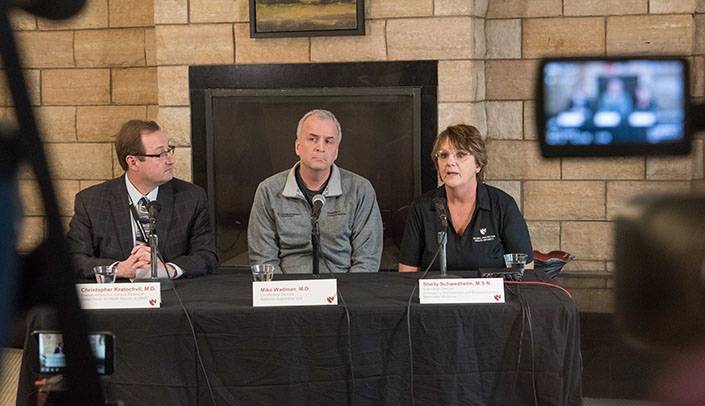Medical center leaders met with members of the media Monday afternoon to discuss the arrival of 13 American citizens, who had been on a cruise ship docked off the coast of Japan for two weeks.
Some of these citizens have tested positive in Japan for COVID-19, or coronavirus, the disease which was first discovered in late 2019 and is believed to have originated in Wuhan, China. Those who have tested positive for this novel coronavirus are only showing mild symptoms of the disease.
The Americans were transported Monday morning to the medical center, where they are being monitored and cared for.
About COVD-19
Currently, there have been 15 documented cases of COVID-19 in the U.S. and zero deaths. While this disease has been more infectious than the SARS outbreak in 2003, it has been far less lethal. Med center experts estimate a fatality rate between one and two percent for COVID-19, with the majority of the fatalities being in people with other medical conditions.
Over the last few days, the med center has been preparing for the potential opportunity to bring back U.S. citizens in support of a joint mission between the Office of the Assistant Secretary for Preparedness and Response (ASPR), the Centers for Disease Control and Prevention, and the U.S. State Department, said Chris Kratochvil, M.D., executive director of clinical research at the Global Center for Health Security at UNMC. Dr. Kratochvil was joined at the press conference by Michael Wadman, M.D., co-medical director of the National Quarantine Unit, and Shelly Schwedhelm, executive director of emergency management and biopreparedness at Nebraska Medicine.
Under the microscope: UNMC/UNO Campus leaders answer questions about the coronavirus
“We have the staff, the facilities and the expertise,” Dr. Kratochvil said. “That’s why the federal government is really placing their confidence in us . . . We’re seen as a trusted partner of the federal government, and we continue to validate that.”
“We were there for Ebola, we were there for the rescued Americans now being monitored at Camp Ashland and we’re going to be there for these American citizens as well,” said Jeffrey P. Gold, M.D., chancellor of UNMC and University of Nebraska at Omaha. “Because we are one of the world leaders in this arena, we were asked by our federal partners, the U.S. Department of Health and Human Services, to rise to the challenge when our nation once more critically needs our expertise. Clearly, this is again, one of those times.”
The recently opened National Quarantine Unit on the UNMC/Nebraska Medicine campus was designed for this very purpose — to safely monitor Americans after exposure to an infectious disease. The unit, which has a 20-bed capacity, is strategically located in close proximity to the Nebraska Biocontainment Unit, should a higher level of care be needed.
Dr. Wadman was part of the team to assess the citizens when they arrived in Omaha.
One patient was transported to the Biocontainment Unit, because of a chronic condition and also because of experiencing some mild symptoms, which Dr. Wadman described as lightheadedness, shortness of breath, fever and mild cough. The remainder of the arrivals were transported to the quarantine unit.
The passengers “were very tired after the long travel, but their spirits were high, they were very grateful,” Dr. Wadman said. “Once they got on the buses and were on their way here, they were talking with each other and us and were very upbeat and glad to be here.”
Like the 57 Americans staying at Camp Ashland, the Americans from the cruise ship arrived at a remote and isolated aircraft parking area at Eppley Airfield and did not enter the terminal. They boarded a bus and were driven straight to the National Quarantine Unit. Flight operations at Eppley Airfield will remain normal and unaffected.
“We understand the significance of providing effective quarantine and isolation, and are grateful that we can help fellow Americans at a time of need,” said James Linder, M.D., CEO of Nebraska Medicine. “I want to assure everyone that our Nebraska Medicine/UNMC colleagues are among the best in the world at handling situations like these. In many instances, they’ve written the book on the most effective methods of quarantine and treatment. The Nebraska method is the tested standard.”
Schwedhelm said each arrival would be in quarantine for 14 days at least.
“For those who have a confirmatory test, we very well may have a longer length of stay,” she said. “There will probably be some testing and retesting before they are allowed to be discharged.”
Schwedhelm said there were many controls in place to prevent the spread of infection.
“And of course, all of the health care workers involved in this mission are very skilled,” she said. “We practice and practice and train — and teach — on these topics related to infection prevention and control. So we have a lot of confidence in our team.”
